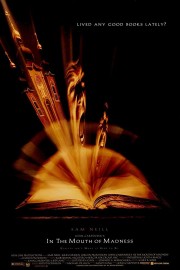In the Mouth of Madness
I know that John Carpenter’s “In the Mouth of Madness” was an early Carpenter film for me- I’m fairly certain that “Halloween” was first- but his 1995 psychological thriller left quite an impression on me when I watched it. While I certainly have no problem with a good slasher or monster film, I’m finding that my tastes in horror lean more towards the psychological, where the character’s sanity is called into question by the events in question. My favorite horror film of all-time is “The Shining,” and many of the ones I love fall into some subcategory behind it, as they challenge the viewer, and their main characters, in questioning what is real and what isn’t. Not only is “In the Mouth of Madness” a pretty great example of this, but it has one of the best ending scenes I think I’ve ever seen a psychological horror film end with, because let’s face it, sometimes, all you can do is laugh.
The film starts with a printing press getting copies of a new book from horror writer Sutton Cane ready to publish. It is called, In the Mouth of Madness, and it isn’t long after before we are introduced to the main character of the film, John Trent (Sam Neill). Trent is an insurance investigator that people bring in to see whether claims are fraudulent or not, and he’s about to be hit with his biggest challenge yet. The publisher of Cane’s work is claiming that their golden goose- he is supposedly a higher seller than Stephen King- is missing, and because of the rabid excitement his work inspires, Trent is not sure whether this isn’t a publicity stunt. The publisher (personified by Charlton Heston) doesn’t have all of the pages of Cane’s newest book, so they ask Trent to go where Cane might be with his long-term editor (Julie Carmen), and retrieve the rest of his book. It’s not long on their journey until some weird things start to happen, as if Trent being attacked by a man with an axe early on in the film wasn’t enough.
The screenplay by Michael De Luca is inspired by the life and work of H.P. Lovecraft, whose most famous novella is At the Mountains of Madness, but the thing that resonated with me about the film is how it seems to represent a commentary by Carpenter, whose early work was some of the most significant of the ’70s and ’80s in horror, on how people panicked over the way the horror turned more visceral in its gore. There was moral outrage over the way slashers portrayed violence, and had killers that never seemed to die, and Carpenter was right in the center of that after “Halloween” became a seminal franchise in the decade. Stephen King was, as well, as the town all of Cane’s work is set in is not unlike his Castle Rock. The mania people are worked in to as a result of Cane’s work was the fantasy of how parents and groups like the Moral Majority looked at people who took in slasher films a plenty and fantasy games like Dungeons & Dragons. Trent and Carmen’s Linda Styles’s make their way to where they think Hobb’s End, the town Cane is allegedly staying in, and things get particularly strange, yet also begin to snap into focus.
Revisiting the film makes me appreciate the craftsmanship Carpenter brought to the film, and the work he gets from his actors is really strong. Neill is fantastic as Trent, a skeptic whom, after a certain point, cannot help but accept that maybe, there is some truth to the unbelievable story he finds himself wrapped in. Heston is delightful as someone whom he question whether he’s being truth, yet cannot help but believe when key pieces of the story are coming into place. As administrators and psychiatrists at the beginning of the film, David Warner and John Glover bring weight to their roles. Carmen is not as strong as Styles, but she does a good job as someone who provides exposition about Cane for Trent, but also realizes, like Trent, there is something more at work in this film. And as Cane, Jürgen Prochnow is deliciously pretentious in his few scenes. The film is, ultimately, about Trent, however, and his closing moments are some of the most entertaining, subversive I’ve seen a filmmaker pull off to get to his punchline. Carpenter had me laughing at the end, while also being messed up in the head as the film gets there.










